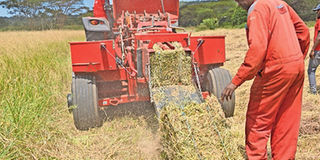Brief news on farming and agribusiness developments from around the region

Participants are taught how to bale hay at Rawhide Farm in Kampi ya Moto, Nakuru. This was when students from Strathmore Business School‘s AGCO agribusiness qualification programme visited the farm and got the opportunity to see and learn how quality seeds, fertiliser and mechanisation can boost farmers’ yields. PHOTO | FRANCIS MUREITHI | NMG
What you need to know:
- The intensive one-year course combines theoretical and practical learning on mechanisation, agricultural science, farm and marketing management.
- The group was also shown how to use a planter, which allows the seeds to be placed at the right depth and given intervals as specified by the seed producers.
- In Kenya, maize is the main staple food crop claiming up to 80 per cent of the total cereals produced which include rice, wheat, millet and sorghum.
- The research paper evaluates sorghum production in Kenya, farmer characteristics, availability of inputs, and opportunities for sorghum growers in the global market.
Students get lessons on using machines to boost farm production
Students from Strathmore Business School‘s AGCO agribusiness qualification programme got the opportunity to see and learn how quality seeds, fertiliser and mechanisation can boost farmers’ yields.
The graduates of the programme from Kenya and Nigeria visited Rawhide Farm in Kampi ya Moto in Nakuru and got hands on lessons from FMD East Africa on how to use tractors in ploughing, planting and applying fertiliser.
The intensive one-year course combines theoretical and practical learning on mechanisation, agricultural science, farm and marketing management.
Joe Mills, the farmer, explained that the use of a deep subsoiler to prepare land for planting preserves moisture in the sub soil.
“Moisture in the soil is as good as money in the bank. The common practice of using disc ploughs turns over the soil resulting in loss of moisture because the soil dries out. This leaves a shallow dry seed bed of approximately 12cm which results in poor crop yields,” he told the students.
John Agboola, a student from Nigeria, said his enthusiasm in farming made him to study agriculture at the Federal University of Technology in Abure.
“After this training, I would like to help increase the yields from the family land and I think it will be possible to join hands with neighbours.”
The group was also shown how to use a planter, which allows the seeds to be placed at the right depth and given intervals as specified by the seed producers.
The students also learnt how to make hay using machines that include a mower and a baler.
Sharon Waswa from Trans Nzoia who studied conservation biology at Kenyatta University and did postgraduate training in Development of Rural Resources for Agriculture at the University of Florence in Italy, said she is looking forward to helping small farmers to improve yields.
-Francis Mureithi
****
Eight counties food insecure, report says
High level of poverty in at least eight counties is affecting food and nutritional security, a new report shows. Affected counties are Turkana, Samburu, Tana River, Baringo, West Pokot, Busia and Siaya.
In Turkana, almost one in five households (19 per cent) have poor levels of food consumption, according to the Zero Hunger Srategic Review 2018 report.
“Rural households in non-arid areas only purchase about 30 per cent of the food they consume while they produce about 70 per cent. This is different in the arid counties where households produce about 70 per cent of the food requirements,” said the study.
However, according to the report, food insecurity is not just a rural problem as it is also experienced in the urban settlements.
“In Nairobi, 19,000 households experience poor nutritional feeding levels and 77,000 households experience borderline levels of consumption,” says the report.
In Kenya, maize is the main staple food crop claiming up to 80 per cent of the total cereals produced which include rice, wheat, millet and sorghum.
-Magdalene Wanja
****
New study shows sorghum is a money-maker
Sorghum farmers across the 15 growing counties can raise their profits by over 220 per cent following increased demand from beer brewers, a new study shows.
The research paper produced by Egerton University’s Tegemeo Institute and Kenya Breweries Limited (KBL) reported that entry of the KBL into the sorghum market for keg beer production has turned a huge boost to smallholder farmers.
Jane Karuku, KBL managing director, said that the company is not only providing a ready market for contracted farmers, but is also enhancing growth and recognition of the sorghum crop.
The beer brewers uses sorghum to manufacture low-cost malt known as Senator Keg and have currently contracted over 45,000 sorghum farmers across the country.
“The introduction of Senator Keg beer provided a pull factor for sorghum to claim its space as a cash crop” Karuku said.
“Our belief is that the crop will develop further to continue offering food security and incomes from selling locally and even globally to improve standards of living in Kenya.”
The research paper evaluates sorghum production in Kenya, farmer characteristics, availability of inputs, and opportunities for sorghum growers in the global market.
Data from the paper shows most sorghum farmers have land sizes ranging from 0.4 to 0.6ha.
-Leopold Obi





